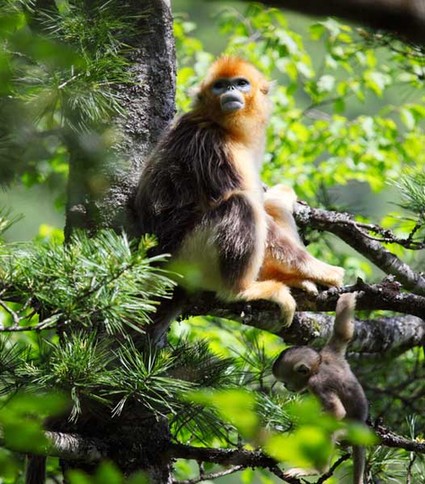
|
 |
|
?Two golden monkeys enjoy the tranquility in the Shennongjia Nature Reserve in Hubei province. [Photo/China Daily] |
Forest coverage has increased to 88 percent since the district government banned logging in the region and encouraged people to move from reserves to nearby towns, said Luo Yongbin, director of the information office of the Shennongjia district government.
Shennongjia, in Central China's Hubei province, covers 3,200 square kilometers and has a population of 80,000. Its core region is the Shennongjia National Nature Reserve, which is recognized by the United Nations as a World Biosphere Reserve and is famous as home to the "wild man", allegedly a mysterious ape-man creature.
However, logging has dominated the local industry in the past decades, reducing forest coverage to 70 percent in the late 1990s. To protect the forest and its unique biodiversity, the Shennongjia government decided to ban logging of all natural forests in the region in 2000, said Luo.
By the end of last year some 10,000 residents had been relocated from their harsh environment, enabling them to have access to modern social services, said Luo.
"In recent years I've found that cases of logging or hunting wild animals are becoming rare," said Tang Yunjun, a ranger at the Yinyuhe station of the Shennongjia National Nature Reserve, who has worked in the station for six years.
"Now no one is living in the reserve anymore, and we can see the lands previously inhabited by villagers covered by forest again, and the forests are growing bigger year by year," he said.
Yang Minghua, in Muyu town, was among the first to move from the mountains 10 years ago.
"I grew crops, like corn and potatoes, and collected herbs to make a living then," he said. "The land in the mountains was not fertile, and yielded little. The total income could barely make ends meet for my family."
Encouraged by the local government, Yang moved to Muyu town in 2001 and built a new house there with a government subsidy of 5,000 yuan ($780) and compensation from the government for his lost land, which was later planted with trees.
"The well-preserved pristine environment and beautiful scenery attracted many tourists here, but there were not enough hotels in the small town," said Yang.
So Yang rented out several rooms of his house and later built more rooms to become a hostel manager.
"Now my 31 rooms can handle 60 tourists," he said. "Living in the town is much better than in the mountains. Life is much more comfortable."
Before the policy was carried out nearly the whole town was cutting down trees, producing wood products and selling them outside, said Luo.
"Many also survived by hunting and collecting herbs. However, such a traditional life style damaged the environment, and most people in Shennongjia lived in harsh conditions and were very poor.
"So we decided to develop low-pollution industries, such as tourism and hydropower, to help people out of poverty and protect the environment."
In the past few years, infrastructure such as roads and electricity has been improved, and several parks and new hotels have been built, said Luo. Last year, the total tourism revenue of the area reached 1 billion yuan, five times the figure of five years ago, and the number of tourists exceeded 1 million, according to government statistics.
"The place is so cool I don't have to turn on the air conditioner in July," said Li Jie, a retired teacher from Wuhan, Hubei province. She said she stayed in a hostel in Muyu town for a whole month last year and is going to spend another summer here.
Su Aoli, the owner of a hostel in town, said only several rooms of his four-story hostel were vacant in mid-July.
"I think I will renovate my hostel during the winter, when there are fewer tourists, as I found most tourists prefer expensive and more comfortable rooms. Money seems not to be a problem," she said.
However, while booming tourism relying on the well-preserved ecology brings benefits to some residents, some wish the government would work more on infrastructure.
Zheng Deming now lives in a three-room apartment in a resettlement area in Muyu town. Besides raising bees for honey, he sometimes does odd jobs and drives a taxi during summer, when the town is crowded with tourists.
"I planned to open a hostel to cater to the tourists like some other residents have done, but the road near my residence is poor," he said. "The government promised to repair the road but has not taken action yet."
In last year's work report, the government pledged to develop infrastructure and promote urbanization in the next few years. The first airport in the region is being built, and a new expressway is expected to be constructed soon.
However, some visitors also worried about the rapidly developing tourism.
"With so many new hotels being built, and so many scenic spots open to the public, I worry whether we will be able to enjoy such a beautiful natural scenery in 10 years," said Li Jie, the retired teacher.
Contact the writers at wangxiaodong@chinadaily.com.cn and zhoulihua@chinadaily.com.cn


 Washington to remain focused on Asia-Pacific
Washington to remain focused on Asia-Pacific RQFII target blue chips amid bear market
RQFII target blue chips amid bear market Australian recall for top two exporters
Australian recall for top two exporters China fears new car restrictions
China fears new car restrictions